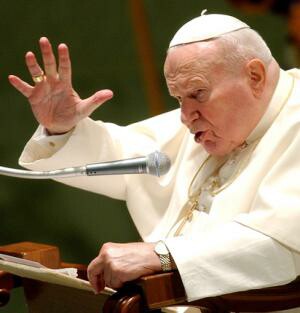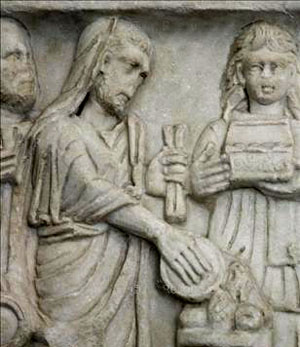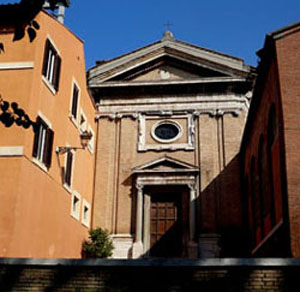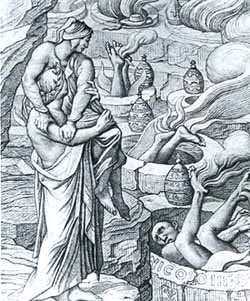 |
Faith under Attack
JPII, Claudius & Prisca
Lyle J. Arnold, Jr.
In a series of summer talks in 1999, John Paul II informed the world that Heaven and Hell are not "places," but rather "states of being," and pretended that the language of Holy Scripture referring to them is a mere "symbolic language." In one of those speeches he also expressed the doubt as to whether anyone in all of history has ever been "involved" in eternal damnation.(1)

"Hell and Heaven are not places" |
Such opinions, coming from the highest office in the world, are that some people should adopt a casual or even incredulous attitude about sin and Hell. Yet these are doctrinal pronouncements, and the absolute certainty of the objective existence of Heaven and Hell is critical for a soul to remain in the state of sanctifying grace. Indeed, we are commanded to work out our salvation "with fear and trembling." (Phil 2: 12)
JPII's statements flagrantly contradict Holy Scripture and Catholic teaching, as well as the vision of Hell at Fatima. For that reason it seems opportune to transcribe the words of the omnipotent God spoken directly to an egregious perpetrator who was cast into Hell in the early times of the Church.
The Emperor and the Virgin
Claudius II reigned over the Roman Empire for two years, from 268-270 A.D. He was declared Emperor by his army after he arranged the murder of his predecessor Gallienus. During the reign of the latter, the bloody persecutions against Christians were relaxed.
When Claudius took power, however, he issued a new and most impious edict to the whole Empire that the Christians should offer sacrifice to the gods or be put to death. He ordered his soldiers to seize all who were known to be Christians, men and women, and force them to sacrifice to the gods. (2)
Claudius' brief reign is one of the most interesting of the Roman Emperors because he chose to wage a suicidal war against one of the most pure, beautiful and intelligent virgins who has ever lived.

Claudius II offering sacrifice to the gods |
St. Prisca was of noble blood – her father had been thrice a consul – and was exceedingly rich. Prisca was also a Catholic, “adorned with the grace of God and the most perfect purity of morals." (3) Claudius made two fatal errors in his humiliating bouts with Prisca. The first was that he sought to force her to sacrifice to the pagan gods. The second was that he lusted after her. She was eleven years of age.
When Prisca was brought before Claudius, he said to her, "I have arranged to have you brought to me, to make you my mistress and the sharer of power of my kingdom." Then he ordered Prisca to the temple of Apollo and told her to sacrifice to the idol.
The blessed child prayed thus: "Glory be to Thee, O glorious Father! I invoke Thee, I implore Thee, cast down this motionless and dumb idol, the vile emblem of falsehood and corruption."
As she prayed, a great earthquake shook the whole city, the idol fell and broke into fragments, and a fourth part of the temple was destroyed. A multitude of people and priests of the temple were likewise destroyed. Claudius was terrified and fled.
Then the Devil who dwelt in the idol spoke thus: "O virgin Prisca! Servant of the great God who reigns in Heaven, you who keep His commandments and has stripped me of my habitation! O Emperor, persecutor of the Christians! You have found a holy soul, through whom you will end thy reign in disgrace."
Humiliated by this incident, Claudius ordered the executioners to beat Prisca. After they had beaten her for some time, they lost their strength and cried out to Claudius: "Woe to us sinners! Surely we suffer more than this girl. She is not hurt, and we are in pain. We beseech thee, O Emperor, to have her taken from us."

St. Prisca's Church in Rome |
But Claudius was adamant, and ordered more beatings. Prisca prayed, "Blessed art Thou, O Lord Jesus Christ! For Thou givest eternal peace to those who believe in Thee."
At this she was surrounded with a bright light, and God spoke from Heaven: "Daughter, be of good courage and fear nothing, for I am the God whom thou invokes, and I will never abandon thee."
The next day Prisca was removed from her prison cell and brought before Claudius, who said to her, "Will you consent to live with me, and sacrifice to the gods?"
Prisca declined, and Claudius, in a fury, ordered her to be stripped and beaten with whips. The child's body appeared as white as snow, and so bright was that light that issued from her that the eyes of the beholders were dazzled.
Again she remonstrated with Claudius, "Your father Satan is the prince of darkness; he loves fornicators and embraces magicians." Enraged, Claudius threatened to have her beaten with rods again, but Prisca merely smiled and rebuked him anew.
Claudius had her removed to her cell, and planned to have her smeared with the oil of fat and be burnt the next day. All that night Prisca sang hymns, joined by many others who all praised God with her. The next morning, her jailer reported that the air in the prison was filled with a sweet perfume. He and the other torturers found the blessed Prisca sitting on a throne, surrounded by a multitude of Angels, whose brightness it would be impossible to describe.
Terrified by what they saw, it was reported to Claudius, who once again ordered her to the temple to sacrifice to the gods. Once there, a voice came from the idol, "Woe to me! Where shall I fly from Thy Spirit, O God of Heaven? Fire is pursuing me from the four corners of the temple."
Prisca, after a long prayer to God, said to the Devil," I command you to depart, you who dwells in this deaf and dumb idol." A noise like thunder was immediately heard, and fire fell from Heaven, which consumed the priests of the temple. A multitude of people were killed; the purple on the right arm of the Emperor was burnt, and the idol was reduced to ashes.
Next Claudius ordered the executioners to have Prisca torn apart with iron hooks, then stretched on the rack and cut with knives. After this torture, Prisca was returned to her cell, where the chief executioner saw her sitting on a high throne, her beautiful face shining like the sun.
Hearing this, Claudius said, "As Your Majesty ordered me, I have tortured the wicked Prisca with iron swords and hooks and I have tried to kill her, but, behold, she is still alive, and refuses to sacrifice."
The next day she was placed in the arena and a lion, unfed for four days, was released to devour her. The lion, instead of attacking the child, showed not "terror but love, and leaning forward, it bent down before her and kissed her feet." Claudius commanded that the lion be returned to its den, but before the beast left the arena it attacked a relation of Claudius and killed him.

Dante described in detail the place that the bad Popes have in Hell |
Three days later Prisca was again brought to the temple and ordered to sacrifice to the gods. Her face was "resplendent as the sun." Again Claudius ordered that she be suspended and torn with hooks. But the arms and legs of the executioners were afflicted with sharp pains, and they cried out to Claudius, "Free us, we beseech thee, from these pains; the Angels of God are tormenting us."
Then a great fire was made and Prisca was cast into it, but immediately there came a great rain and a furious whirlwind, scattering the flames to every side, burning the spectators.
The Emperor's next move was to have Prisca's beautiful hair cut off. Prisca prayed, "It is written by the Apostle, if a woman have a beautiful head of hair, it is her ornament. You have taken from me that hair which God has given me; God will take from you your kingdom."
Prisca was then locked in the temple for a day and a night, and the guards reported to Claudius that "they heard the voices of a multitude of Angels." When the doors of the temple were opened, those present said "they saw the blessed Prisca, whose beauty was ineffable, sitting on a throne and surrounded by a great crowd of Angels. But their god they saw lying on the ground."
Finally the end came. Prisca was beheaded, and the executioners "fell on their faces and died."
When the news reached the Pope, he and another Christian "found her body between two eagles, one at her head, the other at her feet, guarding it lest the beasts should touch it. There was a dazzling light around her head, and her face smiled in the Holy Spirit. Then the Pope and his companion dug a grave and buried her in that spot."
When Claudius heard of this he went insane and "like a rabid dog ate his own flesh," crying out to God to have pity on him. He soon expired, and the voice of God was heard saying, "Enter, Emperor, into the furnace of Hell. Go to exterior darkness, for gloomy places of pain are prepared for thee." Then a great earthquake took place, and "on account of the voice," more than 5,000 persons were converted.
Here it is worthwhile for the reader to note that God used the actual word "place" in referring to Hell, directly contradicting JPII's word that "Heaven and Hell are not places."
I close praying to Our Lady of Fatima asking her to help Catholics to be immune to the errors of the Conciliar Popes on their teaching of universal salvation. I ask her Immaculate Heart to confirm her children in their conviction of the existence of Hell.
"You saw Hell, where the souls of poor sinners go," she said at Fatima. May this truth help Catholics resist Progressivism that has metastasized throughout the Church, so that they be the builders of the Reign of her Immaculate Heart.
1. The Redwood Crozier (diocesan paper of Napa county, California), October 1999, p. 8.
2. Father A.J. O'Reilly, D.D., The Martyrs of the Coliseum, Rockford, IL: Tan, 1987, p. 288, 293.
3. Ibid. The story and other quotes are taken from Chapter 17.

Posted on June 16, 2010

Related Articles of Interest
 Hell: A Demand of Divine Goodness Hell: A Demand of Divine Goodness
 'Hell Exists, But No One Goes There' 'Hell Exists, But No One Goes There'
 Heaven, A Matter of Interpretation Heaven, A Matter of Interpretation
 A Sentence against Christ Crucified A Sentence against Christ Crucified
 Why So Many People Go To Hell Why So Many People Go To Hell
 The Novissima- The Four Last Things The Novissima- The Four Last Things

Related Works of Interest
|
|
Faith under Attack | Religious | Home | Books | CDs | Search | Contact Us | Donate

© 2002-
Tradition in Action, Inc. All Rights Reserved
|
 |
|